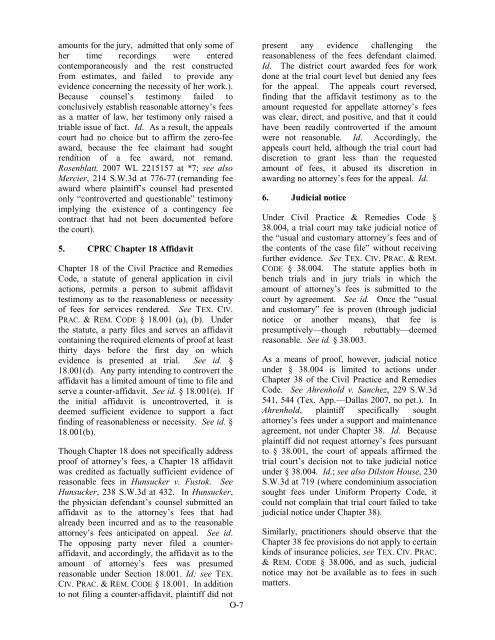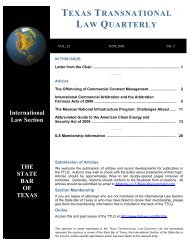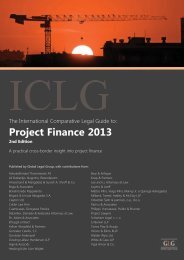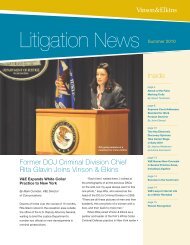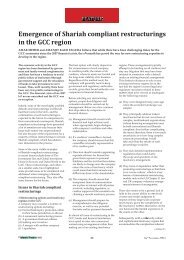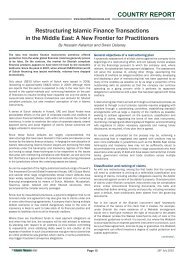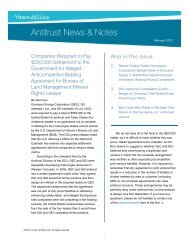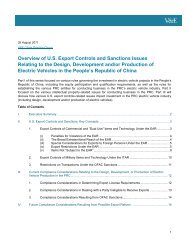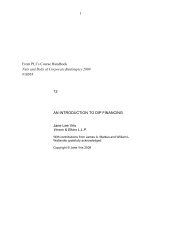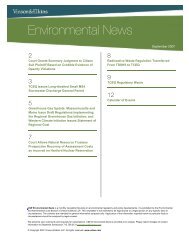Attorney's Fees Update - Vinson & Elkins LLP
Attorney's Fees Update - Vinson & Elkins LLP
Attorney's Fees Update - Vinson & Elkins LLP
You also want an ePaper? Increase the reach of your titles
YUMPU automatically turns print PDFs into web optimized ePapers that Google loves.
amounts for the jury, admitted that only some of<br />
her time recordings were entered<br />
contemporaneously and the rest constructed<br />
from estimates, and failed to provide any<br />
evidence concerning the necessity of her work.).<br />
Because counsel’s testimony failed to<br />
conclusively establish reasonable attorney’s fees<br />
as a matter of law, her testimony only raised a<br />
triable issue of fact. Id. As a result, the appeals<br />
court had no choice but to affirm the zero-fee<br />
award, because the fee claimant had sought<br />
rendition of a fee award, not remand.<br />
Rosenblatt, 2007 WL 2215157 at *7; see also<br />
Mercier, 214 S.W.3d at 776-77 (remanding fee<br />
award where plaintiff’s counsel had presented<br />
only “controverted and questionable” testimony<br />
implying the existence of a contingency fee<br />
contract that had not been documented before<br />
the court).<br />
5. CPRC Chapter 18 Affidavit<br />
Chapter 18 of the Civil Practice and Remedies<br />
Code, a statute of general application in civil<br />
actions, permits a person to submit affidavit<br />
testimony as to the reasonableness or necessity<br />
of fees for services rendered. See TEX. CIV.<br />
PRAC. & REM. CODE § 18.001 (a), (b). Under<br />
the statute, a party files and serves an affidavit<br />
containing the required elements of proof at least<br />
thirty days before the first day on which<br />
evidence is presented at trial. See id. §<br />
18.001(d). Any party intending to controvert the<br />
affidavit has a limited amount of time to file and<br />
serve a counter-affidavit. See id. § 18.001(e). If<br />
the initial affidavit is uncontroverted, it is<br />
deemed sufficient evidence to support a fact<br />
finding of reasonableness or necessity. See id. §<br />
18.001(b).<br />
Though Chapter 18 does not specifically address<br />
proof of attorney’s fees, a Chapter 18 affidavit<br />
was credited as factually sufficient evidence of<br />
reasonable fees in Hunsucker v. Fustok. See<br />
Hunsucker, 238 S.W.3d at 432. In Hunsucker,<br />
the physician defendant’s counsel submitted an<br />
affidavit as to the attorney’s fees that had<br />
already been incurred and as to the reasonable<br />
attorney’s fees anticipated on appeal. See id.<br />
The opposing party never filed a counteraffidavit,<br />
and accordingly, the affidavit as to the<br />
amount of attorney’s fees was presumed<br />
reasonable under Section 18.001. Id; see TEX.<br />
CIV. PRAC. & REM. CODE § 18.001. In addition<br />
to not filing a counter-affidavit, plaintiff did not<br />
O-7<br />
present any evidence challenging the<br />
reasonableness of the fees defendant claimed.<br />
Id. The district court awarded fees for work<br />
done at the trial court level but denied any fees<br />
for the appeal. The appeals court reversed,<br />
finding that the affidavit testimony as to the<br />
amount requested for appellate attorney’s fees<br />
was clear, direct, and positive, and that it could<br />
have been readily controverted if the amount<br />
were not reasonable. Id. Accordingly, the<br />
appeals court held, although the trial court had<br />
discretion to grant less than the requested<br />
amount of fees, it abused its discretion in<br />
awarding no attorney’s fees for the appeal. Id.<br />
6. Judicial notice<br />
Under Civil Practice & Remedies Code §<br />
38.004, a trial court may take judicial notice of<br />
the “usual and customary attorney’s fees and of<br />
the contents of the case file” without receiving<br />
further evidence. See TEX. CIV. PRAC. & REM.<br />
CODE § 38.004. The statute applies both in<br />
bench trials and in jury trials in which the<br />
amount of attorney’s fees is submitted to the<br />
court by agreement. See id. Once the “usual<br />
and customary” fee is proven (through judicial<br />
notice or another means), that fee is<br />
presumptively—though rebuttably—deemed<br />
reasonable. See id. § 38.003.<br />
As a means of proof, however, judicial notice<br />
under § 38.004 is limited to actions under<br />
Chapter 38 of the Civil Practice and Remedies<br />
Code. See Ahrenhold v. Sanchez, 229 S.W.3d<br />
541, 544 (Tex. App.—Dallas 2007, no pet.). In<br />
Ahrenhold, plaintiff specifically sought<br />
attorney’s fees under a support and maintenance<br />
agreement, not under Chapter 38. Id. Because<br />
plaintiff did not request attorney’s fees pursuant<br />
to § 38.001, the court of appeals affirmed the<br />
trial court’s decision not to take judicial notice<br />
under § 38.004. Id.; see also Dilston House, 230<br />
S.W.3d at 719 (where condominium association<br />
sought fees under Uniform Property Code, it<br />
could not complain that trial court failed to take<br />
judicial notice under Chapter 38).<br />
Similarly, practitioners should observe that the<br />
Chapter 38 fee provisions do not apply to certain<br />
kinds of insurance policies, see TEX. CIV. PRAC.<br />
& REM. CODE § 38.006, and as such, judicial<br />
notice may not be available as to fees in such<br />
matters.


